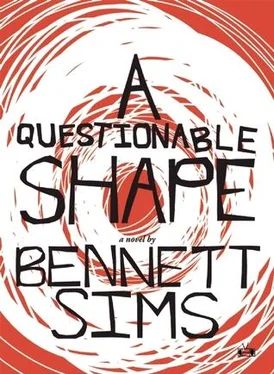I still have not tried talking to Matt this morning. We left my apartment in silence, with some vestigial tenseness from last night. My plan was to deliver my speech when we got here, but I was too infuriated. Now I’m stuck waiting in the car, killing time until he returns. It will have to be when he gets back. The moment he sits down in the driver’s seat, I will have to talk to him. And so that is what I have been preparing to do while he’s been inside: rehearsing what I will say to him. Drafting an apostrophic monologue in my mind. Telling him things in my head and telling myself that I’ll tell them to him when he returns. What I’ve been telling him is this:
‘No, listen. You’re never going to find your father. Isn’t it time you gave up this particular ghost? To have checked the number of sites that we have, the number of times that we have, for as long a time as we have, would have been enough to satisfy any reasonable person. Your father’s obviously been hit by a car or shot dead, or else he’s fallen off the map altogether. Wandered into a swamp and sunk. But you’re not a reasonable person. You want to check each site more, even to check more sites. You ask me, “What if he isn’t in Baton Rouge?” What if? You’ll drive to New Orleans, Mississippi, Arkansas, is what if. And why? Because he’s “a walking corpse!”, “a rotting corpse!”, “straight out of Revelations!” Because he has to be “burned or buried!” forthwith! Until you went off like a Neo-Nazi about the need to extinguish the infected, I thought that you might still want to protect the man. If your goal was to commit him to a quarantine before he got himself killed, if our search was conceived as a rescue mission, then indeed your indefatigability would be noble. But it’s obvious that your only aim is patricide: not to avenge your father’s murder, but to re-murder your murdered father. And so your indefatigability is insane. Three weeks ago, when there was a chance he could be found, even this — a mercy killing — might have seemed reasonable to me. But now? The odds are so high that he’s already dead, yet still you need to find him. You’re combing rubble, ground zero, for the man you want to kill. We’re well beyond the dedication of a son who can’t stand the thought of his undead father. This is the dedication of a warlord, a warlord ordering his enemy’s head! And you’ll go further even than that. You won’t stop until you sever his head yourself! With your own hands! It’s not enough for you to just assume that he’s roadkill, you have to see him dead — best if beaten to death by you of course — and you’ll search full-time to do it. Where is all this energy and anger coming from? What has been sustaining you every day for the past month? Whom or what would you even be avenging by killing your father? Certainly not your father. Are you mad at him for letting himself get bitten? Did those unboarded windows, that unlocked door, seem as careless to you, as selfish, as the cigarettes and fast food that he gave himself a heart attack with? Do you think that he has neglected his obligations to you as a father, that he should have fought harder for your sake to survive? That, if he really loved you, he would have come to Citiplace? What shit! You don’t need me to tell you what shit that is, Matt. Because blaming a man for dying is what’s selfish. And clocking eight-hour days to hunt the object of your mourning, so that you can vent your rage on it with a baseball bat. For that matter, enlisting your friend to accompany you on this manhunt, endangering that friend by driving him through infected neighborhoods, without being forthright with him about your motives; but enlisting him anyway because his presence “helps you not to think”—i.e., helps you not to get locked into the obsessive and embittered track of indictments against your father, memories of your father, thoughts of your father that would eat you alive as surely as your father would if only you were left alone with them — is what’s selfish. To say nothing of shattering windows like some madman, so as to fabricate evidence, and feeding me a line about how we’ve been “closing in”… all so that you could spring this extra week on me at the last minute. And what happens then? Am I supposed to ride sidecar like this for another month? A year? How long do you need to keep looking, before you finally accept that there’s nothing to find? No. I can’t let you keep on like this. Not for another week. Not for another day. Whatever it is that I’m complicit in by accompanying you in this, it isn’t healthy for you or right. Call this the intervention of a concerned friend, consider this my official unsolicited advice to you: quit when I do. Forget the search. Try volunteering or something else instead. Defer to the hurricane and count your dad among the victims. But don’t spend another week gnawing at this wound. Because I won’t be gnawing at it with you.’
Is more or less what I’ve been thinking at Matt this morning. Now I twist around in my seat again, to check on the progress at the Freedom Fuel. In the time that I’ve been waiting, additional infected have arrived: either attracted on their own by the commotion, or else rounded up in the vicinity. Wherever they came from, six new silhouettes have converged on the nearest cruiser, clumping around its sides. If the police are concerned about this, they don’t show it. As I watch, a single infected (a stick figure, at this distance) detaches itself from the hood and starts wandering across the parking lot. The cruiser merely flashes its sirens — they glint blue-red, blue-red for three revolutions above its roof — and the infected comes shuffling back.
At the thought of Mazoch watching this from the window, through his binoculars, I become strangely enraged. I can actually feel the monologue welling up in my mouth, like spit before the vomit, and I unbuckle my seatbelt as violently as I can before flinging open the car door.
But when I jog up the driveway and up the porch steps and barge into the living room, I don’t find Matt standing at any of the windows. He’s slumped on the sofa: elbows on knees, head in hands. The binoculars are lying on the cushion beside him. He looks up at me. ‘Any news out there?’ ‘No,’ I say, ‘not yet.’
I take a moment to survey the living room. For the most part it’s as I suspected: no signs of struggle, no traces. But this is the first I’ve been inside since beginning the search, and I’m surprised by the degree of dilapidation. The place looks even more miserable than I remembered. In the short time that the windowpanes have been shattered, the interior appears to have been exposed to catastrophic elements: the carpet where I stand is sodden from dew and rain, and the July air is heavy and hot and hard to inhale, exactly as humid in here as outside. Along the walls, the outlets are nicotine brown around the sockets (power surge?), and in the corner of the room, all three bulbs of the brass floor lamp (whose central pole branches out into three adjustable eyestalks, forming an ommatophorous torchiere, each stalk capped with a miniature trumpet shade of jade-green glass) are blown, charred black from poppage. Elsewhere the unchecked humidity seems to have had effects that I associate only with serious flood damage, for instance in post-Katrina photos of abandoned buildings: the five faux-mahogany particleboard blades of Mr. Mazoch’s ceiling fan all droop downward now, curling together in a tarantula of warped wood; and the walls’ navy paint seems to be, like, bubbling in places, trapped air (I guess) swelling it upward in convex blobs. The place is falling apart. Plus random animals appear to have taken advantage of the shattered windows as well. Dotting the gray carpet are the dried fecal pellets of free-ranging rodents and cats, which fauna are probably also responsible for the shredded paper strewn around the coffee table.
Читать дальше












